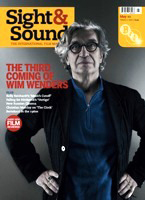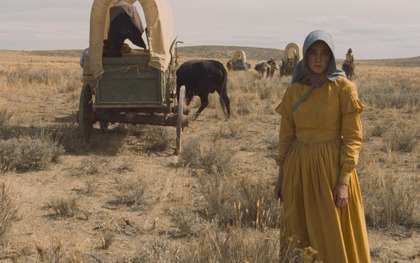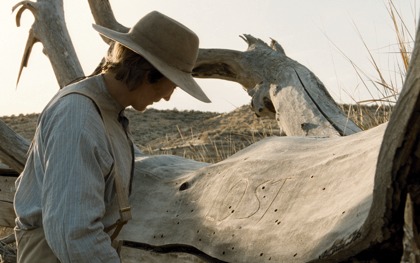Primary navigation

USA 2010

Reviewed by Kate Stables
Our synopses give away the plot in full, including surprise twists.
Oregon, 1845. Three pioneer families have been led on a route off the main wagon trail by boastful guide Stephen Meek, and are lost. Meek's insistence that he knows the way is increasingly disbelieved as water supplies dwindle and they trek through the Oregon High Desert. Young wife Emily Tetherow encounters an Indian brave. Ten-year-old Jimmy White finds gold nuggets but, seeking water, they can't stop to investigate further. Meek and Emily's husband Solomon hunt down the Indian. After some arguing, the pioneers reluctantly decide to let him lead them to water. Emily feeds him, and mends his boot. The Indian scratches carvings in the rocks, and the pioneers fight over whether he is signalling to his tribe. Emily's wagon is smashed to pieces being lowered down a hill. She draws a gun on Meek when he threatens the Indian. William White collapses from exhaustion. The Indian leads them to a tree, which may indicate water nearby. Millie and Thomas Gately don't trust him, and wish to head north. The rest of the group, including Meek, appoint Solomon their leader. They decide to follow the Indian, who strides into the distance. The scene fades to black.
Philip French once dubbed the western genre 'a voracious bastard of a form, open equally to visionaries and opportunists'. Kelly Reichardt's austere, resolutely enigmatic and desolately beautiful pioneer fable suggests she's both at once, paring the western audaciously back to the bone and infusing it with her trademark minimalism.
Meek's Cutoff is simultaneously cerebral and astonishingly cinematic, a historical road movie that stretches the inhospitable landscapes and marginal living of Wendy and Lucy (2008) in intriguing directions. Reichardt is the mistress of signalling much from minute details, transforming the serene opening image of settler women wading across a river, straight out of N.C. Wyeth's pioneer paintings, with the terse, tension-inducing 'LOST' scratched into a branch by Thomas Gately. Her spare vision seems the embodiment of novelist Marilynne Robinson's suggestion, heading up the press notes, that alongside the noisy male myths of gunplay and conquest, there is one - mostly perceived by women - of 'a West dominated by space and silence'.
There's plenty of both here, surrounding a small wagon train of three settler couples, trudging through the sun-baked Oregon High Desert in 1845, increasingly mistrustful of their blowhard guide Stephen Meek as water, and his blustering excuses, run low. Watching their struggle, Meek's Cutoff creates a parallel Old West, one stripped of the traditional trappings of action sequences, expressive characterisation and widescreen. Its Academy ratio gives a claustrophobic, domestic feel - you jump when the camera, roaming over firewood foraging, ends on a pair of Indian feet. Though one could glimpse The Searchers (1956) in its lunar landscapes, or Days of Heaven (1978) in its detached mood and often eerie beauty, the film's small, inward-looking narrative and headily large themes make it a piece of considerable originality.
Time, like the wagon-train, moves molasses-slow here, and Jon Raymond's subtle scripting locates the drama within the pioneers' predicament as they bicker over whether to trust Meek, or the Cayuse Indian they eventually capture to guide them, who may be leading them to water, or to massacre. What invests us in their plight is Reichardt?s lingering obsession with the wheel-mending, bread-kneading, water-rationing, hardscrabble materiality of pioneer life, a close-up view of the women's West unearthed recently by historians. We're riding shotgun, feeling the precarious struggle for survival as Michelle Williams's stoical, compassionate Emily shares food with her struggling neighbours, and Shirley Henderson's journey-frayed mother reminisces about the easy life her father's pigs led by comparison.

However, the film's unswerving severity, with muttered dialogue as heavily rationed as water (it's as taciturn as True Grit is prolix) and the corralling of its cast in Christopher Blauvelt's gorgeous but distancing long-shots, leads the viewer to scrabble restlessly for meaning. The political allegory aligning Meek's cowboy bluster with the Bush years is a tad heavyhanded, even more so when young wife Millie's rants about the Indian's rock-scratched petroglyph 'signals' suggest today's hysteria about terrorism. Rather more effective are the film's glancing but resonant hints at biblical allegory, feminist fable or the reimagining of macho pioneer melodramas such as The Way West (1967).
Raymond's concentration on the fracturing community rather than the individual, part of the film's upending of genre norms, also means that only Bruce Greenwood's garrulous Meek and Michelle Williams's expertly nuanced Emily, wary and warm in equal measures as she reluctantly defends the Indian against Meek's kneejerk racism, register strongly. But while its overarching ambiguity can infuriate, most notably in a daring and frustratingly oblique ending, it's also its strongest suit. What's manifest in Meek's Cutoff isn't destiny, but the difficulty of gauging truth, whether it concerns what's over the hill, or within a human heart.
True Grit reviewed by Ben Walters (February 2011)
Ballad of the wild boys: John Hillcoat and Nick Cave talk to Nick Roddick about their Australian western The Proposition (March 2006)
Man to man: Edward Buscombe on Brokeback Mountain and male bonding in the western (January 2006)
The last frontier: David Thomson on Ron Howard?s western The Missing (February 2004)